Search
Search Results
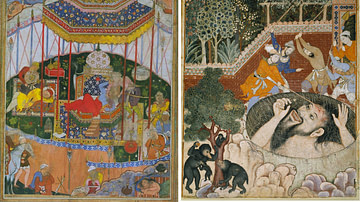
Image
Folios from the Hamzama
Left to right: The Hamzanama is one of the most famous illustrated manuscripts of Mughal painting. It depicts stories from the life of Hamza ibn Abdul-Muttalib (c. 569–625) who was the uncle of the Islamic prophet Muhammad. The book was commissioned...
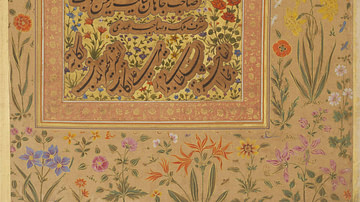
Image
Folio from Shah Jahan's Album by Mir`Ali
A folio from an album of the fifth Mughal Emperor Shah Jahan (1592-1666) which includes calligraphy by Mir 'Ali. Ink with opaque watercolour and gold on paper, 16th century, Bukhara. The illumination is by Daulat, c.1610 – 20, Mughal; borders...
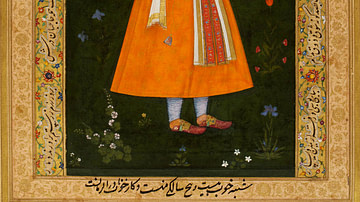
Image
The Emperor Shah Jahan as a Prince
The third Mughal Emperor Akbar's (1540-1605) grandson Shah Jahan (1592-1666) as a young prince. He would become the fifth Mughal Emperor and hold the title of Shah Jahan the Magnificient. Opaque watercolour and gold on paper, by Abu'l Hasan...
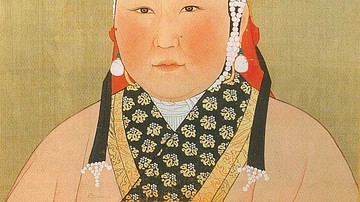
Article
Women in the Mongol Empire
Women in the Mongol Empire (1206-1368 CE) shared the daily chores and hardships of steppe life with men and were largely responsible for tending animals, setting up camps, childrearing, producing food and cooking it. Having rather more rights...
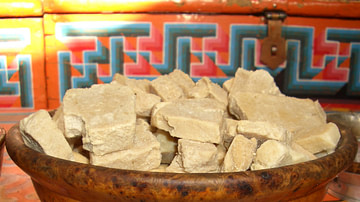
Article
Food & Drink in the Mongol Empire
The diet of the Mongols was greatly influenced by their nomadic way of life with dairy products and meat from their herds of sheep, goats, oxen, camels, and yaks dominating. Fruit, vegetables, herbs, and wild game were added thanks to foraging...
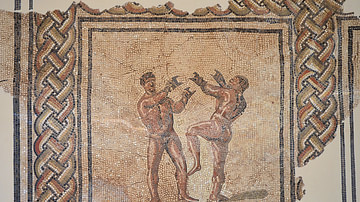
Article
Boxing in the Roman Empire
Boxing is one of the oldest sports in the world that is still practiced today. Included in the original athletic contests of the Olympic Games, pugilism or boxing was well known and loved by the ancient Greeks and Romans. The style used in...
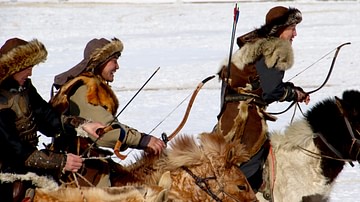
Article
The Nerge: Hunting in the Mongol Empire
The peoples of the Mongol Empire (1206-1368 CE) were nomadic, and they relied on hunting wild game as a valuable source of protein. The Asian steppe is a desolate, windy, and often bitterly cold environment, but for those Mongols with sufficient...
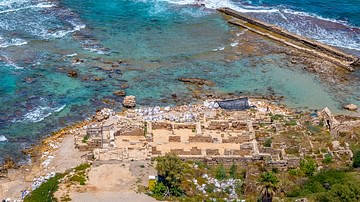
Article
Caesarea Maritima's Role in the Roman Empire
Caesarea Maritima, the city Herod the Great (r. 37-4 BCE) built for Rome on the southeastern coast of the Mediterranean served as the Roman Empire's powerbase of operations both commercially and militarily. With Rome's ultimate goal of adding...
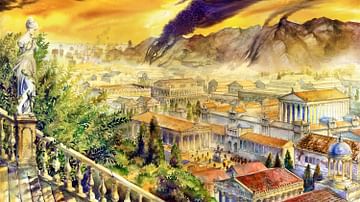
Interview
Interview: Bringing Down the Roman Empire in a Game
Today we are talking to Jon Shafer, lead designer of the computer game At the Gates, now available on PC, Mac, and Linux. In this game, you control a Barbarian tribe during the Migration Age, helping them survive, grow, and hopefully bring...

Article
Colonial Government in the Spanish Empire
The apparatus of colonial government in the Spanish Empire consisted of multiple levels, starting with the monarchy and Council of the Indies at the top and moving down to the viceroy, audiencias, mayors, and local councils. The system was...